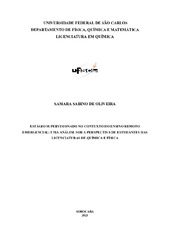| dc.contributor.author | Oliveira, Samara Sabino de | |
| dc.date.accessioned | 2023-04-06T18:06:51Z | |
| dc.date.available | 2023-04-06T18:06:51Z | |
| dc.date.issued | 2023-03-14 | |
| dc.identifier.citation | OLIVEIRA, Samara Sabino de. Estágio supervisionado no contexto do ensino remoto emergencial: uma análise sob a perspectiva de estudantes das licenciaturas de química e física. 2023. Trabalho de Conclusão de Curso (Graduação em Química) – Universidade Federal de São Carlos, Sorocaba, 2023. Disponível em: https://repositorio.ufscar.br/handle/ufscar/17650. | * |
| dc.identifier.uri | https://repositorio.ufscar.br/handle/ufscar/17650 | |
| dc.description.abstract | The present work involves the initial training of teachers in the area of natural sciences, based on internship activities. It is understood, along with different authors, the importance of assuming this activity as something intrinsically related to research, which opposes the common tendency to think of the internship as a mere observation of practice. The central concern of this work is the problematization of "remote internships", a terminology that summarizes the way in which internships are conducted since the beginning of the COVID-19 pandemic. Therefore, the purpose of this work is to discuss the following research questions: What are the main impressions of future teachers about the remote internship? How does this public evaluate their own training, based on the uniqueness of the remote internship? Is it possible to characterize this term “remote internships”, based on the meanings expressed by future professors/licensing students? To this end, we have the following objectives: 1) to present the perceptions of students about the remote internship; 2) discuss, based on these perceptions and with support from the literature, the potential, scope and problems arising from the remote condition, for the execution of the internship; 3) to assess whether the remote internship enhanced the understanding of the use of information and communication technologies. This is exploratory research, which intends to collect
information related to the internship, along with undergraduate students of physics and chemistry. The research carried out showed that the internship under a remote condition enhanced the mastery of Digital Information and Communication Technologies, also signaling the need for effective implementation of public policies for digital inclusion, as well as greater emphasis on instrumentation disciplines related to TDIC. In addition, among the negative aspects experienced according to the impressions of the undergraduates, the lack of interaction with the students stands out, as well as the difficulty in preparing and structuring the internship activities in the virtual environment. | eng |
| dc.description.sponsorship | Não recebi financiamento | por |
| dc.language.iso | por | por |
| dc.publisher | Universidade Federal de São Carlos | por |
| dc.rights | Attribution-NoDerivs 3.0 Brazil | * |
| dc.rights.uri | http://creativecommons.org/licenses/by-nd/3.0/br/ | * |
| dc.subject | Estágios | por |
| dc.subject | Formação de professores | por |
| dc.subject | Formação docente | por |
| dc.subject | Internships | eng |
| dc.subject | Teacher training | eng |
| dc.title | Estágio supervisionado no contexto do ensino remoto emergencial: uma análise sob a perspectiva de estudantes das licenciaturas de química e física | por |
| dc.title.alternative | Supervised internship in the context of remote education emergency: an analysis from the perspective of students degrees in chemistry and physics | eng |
| dc.type | TCC | por |
| dc.contributor.advisor1 | Silva, Fernanda Keila Marinho da | |
| dc.contributor.advisor1Lattes | http://lattes.cnpq.br/6390725197649567 | por |
| dc.description.resumo | O presente trabalho envolve a formação inicial de professores da área das ciências da natureza, a partir das atividades de estágios. Entende-se, junto a diferentes autores, a importância em assumir essa atividade como algo intrinsecamente relacionado à pesquisa, o que opõe a tendência corriqueira de pensar o estágio como mera observação da prática. Temos como preocupação central deste trabalho a problematização dos "estágios remotos", terminologia que resume a forma de condução dos estágios, desde o início da pandemia de COVID-19. Assim sendo, o intuito do presente trabalho é discutir as seguintes questões de pesquisa: Quais são as principais impressões de futuros professores acerca do estágio remoto? De que forma esse público avalia a própria formação, a partir da singularidade do estágio remoto? É possível caracterizar esse termo “estágio remoto”, a partir dos sentidos expressos pelos futuros professores/licenciandos? Para tal, temos como objetivos: 1) apresentar as percepções de estudantes acerca do estágio remoto; 2) discutir, a partir dessas percepções e com apoio da literatura, a potencialidade, o alcance e os problemas decorrentes da condição remota, para a execução do estágio; 3) avaliar se o estágio na forma remota potencializou o entendimento acerca do uso das tecnologias da informação e comunicação. Trata-se de
pesquisa exploratória, que pretende coletar informações relacionadas ao estágio, junto a estudantes das licenciaturas de física e química. A pesquisa realizada evidenciou que o estágio sob condição remota potencializou o domínio acerca das TDIC sinalizando ainda para a necessidade de implementações efetivas de políticas públicas de inclusão digital, assim como maior ênfase nas disciplinas de instrumentação relativa às TDIC. Além disso, entre os aspectos negativos vivenciados segundo as impressões dos licenciandos, destaca-se a falta de convívio com os estudantes bem como a dificuldade de elaborar e estruturar as atividades de estágio no ambiente virtual. | por |
| dc.publisher.initials | UFSCar | por |
| dc.subject.cnpq | CIENCIAS HUMANAS::EDUCACAO::TOPICOS ESPECIFICOS DE EDUCACAO | por |
| dc.publisher.address | Câmpus Sorocaba | por |
| dc.contributor.authorlattes | http://lattes.cnpq.br/3101932826546532 | por |
| dc.publisher.course | Química - QL-So | por |

